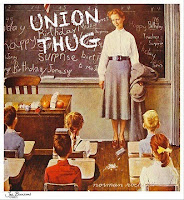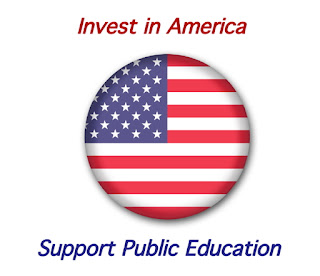Be sure to enter your email address in the Follow Us By Email box in the right-hand column of our blog page to be informed when our blog posts are published.
THIS WEEK
Our regular editor is on vacation. Enjoy the links provided below without the usual editorial comments.
INDIANA REPUBLICANS TARGET TEACHERS UNIONS...
‘Deregulation’ bill is about sidelining unions
From School Matters
I have to pull out the Henry Adams quote at least once every session of the Indiana General Assembly: “Politics, as a practice, whatever its professions, has always been the systematic organization of hatreds.”
How else do you explain Senate Bill 486, an “education deregulation” bill that seems to be largely about punishing the Indiana State Teachers Association and the Indiana Federation of Teachers.
The measure does include some deregulation, but a key component would repeal current law that gives teachers, through their unions, a voice in how their schools operate. Blocking it has become the top priority for the ISTA and IFT, which brought hundreds of teachers to the Statehouse last week to protest.
Why would the Republican supermajority want to punish the unions? Well, because they support Democrats...
...AND THEN VOTE TO ARM TEACHERS
Indiana Senate approves handgun training fund for teachers
From the Fort Wayne Journal Gazette**
Indiana state senators advanced a bill Tuesday that would make state funding available for teachers seeking firearms training, a move critics have said could increase the number of guns in school to the detriment of students.PRIVATIZATION
The 42-8 vote comes after this past weekend’s three-day National Rifle Association convention in Indianapolis, which fell on the second anniversary of a mass shooting in the city at a FedEx facility that killed nine people.
The House bill first advanced in February, amid teachers’ objections that having additional guns in schools would worsen school safety. On Tuesday, two Democrats joined all Republican state senators in voting for the bill.
Bill to divert tax revenue to charter schools clears Indiana House
From WISHTV.com 8
Supporters of traditional public schools on Monday said new charter school legislation could jeopardize future school funding ballot questions.
The Indiana House voted along party lines to approve legislation that would require school corporations in Marion, Lake, Vanderburgh, and St. Joseph counties to allocate a portion of the revenue from any tax levy adopted after May 10 to charter schools in those counties. It marks a major departure in charter school funding from current policy, which uses a grant-based model...
The bill already passed the Senate, but has to go back to that chamber due to changes the House made.
School Privatization Flunks Out in Kansas and Texas
From ITPI: In the Public Interest
5) Kansas: A school privatization measure has been soundly beaten back in the state legislature and the privatizers are nursing their political wounds. “Republican lawmakers saw a negotiated school choice proposal fail early Friday morning in the Kansas Senate amid stiff opposition from public education advocates, while the fate of an education budget that districts say will cost them hundreds of millions of dollars remains in question. School districts had excoriated the choice proposal, Senate Bill 83, which also would have included the first year of a plan from Gov. Laura Kelly to increase special education funding, as tantamount to school vouchers...
6) Texas: In yet another defeat for school privatization forces in a Red State, the Texas House of Representatives has voted to prohibit state money from funding private school vouchers or education savings accounts. “The move is a setback to one of Gov. Greg Abbott’s top priorities to provide ‘school choice’ with state-funded private school tuition subsidies. The House approved State Rep. Abel Herrero’s amendment to the state budget on a bipartisan 86-52 vote.
Idaho GOP Rejects School Voucher Bill
From Peter Greene in Forbes
Last year, Idaho’s legislature passed a limited school voucher bill; this year school voucher supporters raised a more expansive proposal that was just defeated by Republicans.
Last year’s Empowering Parents Grant Program used $50 million of American Rescue Plan recovery money to give education vouchers to families. It limited the education savings account (ESA) vouchers to students who were already enrolled in public schools and whose families had an income equal to or less than 250% of the free or reduced lunch cut-off.
That program was established on a modest scale. This year voucher supporters proposed a larger, more universal form.
Senate Bill 1038 included no income limits and no requirements for previously attending public school. In other words, a wealthy family who had always enrolled their children in private school or home school would get $6,000 of taxpayer money, and that money would be pulled from the funding for schools that the students had never attended in the first place; the school’s funding would be reduced, but their operating costs would not.
TESTING
Forgotten Pre-Covid Report Reveals Standardized Testing Weaknesses in PA
From Gadfly on the Wall Blog
The majority of teachers and principals in Pennsylvania hate standardized tests.
An increasing number of parents are refusing to allow their kids to take the tests.
And there may be better alternatives to the state’s Keystone Exams.
These were just some of the key findings of a blockbuster report from June 2019 by the state General Assembly’s Legislative Budget and Finance Committee.
The report, “Standardized Tests in Public Education” was published about 9 months before the Covid-19 pandemic hit.
It effectively got lost in the chaos that followed the global pandemic.
However, now that things are returning to some semblance of normalcy, it seems that bureaucrats from the state Department of Education (PDE) are taking the wrong lessons from the report while the legislature seems to have forgotten it entirely.
The report was conducted because of legislation written by state Sen. Ryan P. Aument (R-Lancaster County). It directed the Legislative Budget and Finance Committee to “study the effectiveness of standardized testing, including the Keystone Exams and SATs, and their use as indicators of student academic achievement, school building performance, and educator effectiveness.”
The key findings are as follows...
FLORIDA GOVERNOR CONTINUES CULTURE WARS
Florida Bans Instruction about Sexual Orientation or Gender Identity in All Grades
From Diane Ravitch
Florida Governor Ron DeSantis thinks that if he bans or censors a subject, then the thing he banned will disappear. Obviously, he hates gays. Therefore, his state board of education voted in the last hour or so to ban any mention of sexual orientation or gender identity unless they are part of a reproductive health course. Ironically, Florida has a very large gay population in Miami and Fort Lauderdale and elsewhere. But DeSantis believes he can appeal to the MAGA base by repeatedly showing his hatred for gays. Every fascist must have scapegoats. For DeSantis, it’s gays, trans, and drag queens, but also Blacks and immigrants. And any books about them. Some Republican mega donors have decided to back off and withhold funding him to see how far he goes with his calculated campaign of hatred and divisiveness.
The Orlando Sentinel reported...
**Note: The Fort Wayne Journal Gazette is behind a paywall. Digital access, home delivery, or both are available with a subscription. Staying informed is important, and one way to do that is to support your local newspaper. For subscription information, go to fortwayne.com/subscriptions/ [NOTE: NEIFPE has no financial ties to the Fort Wayne Journal Gazette]
†Note: NEIFPE's In Case You Missed It is posted by the end of the day every Monday except after holiday weekends or as otherwise noted.
###















